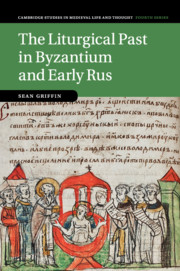Book contents
- The Liturgical Past in Byzantium and Early Rus
- Cambridge Studies in Medieval Life and Thought Fourth Series
- The Liturgical Past in Byzantium and Early Rus
- Copyright page
- Contents
- Acknowledgements
- Abbreviations
- Introduction
- Chapter 1 Liturgy and History in Early Rus
- Chapter 2 The Rus Primary Chronicle
- Chapter 3 Vespers at the Kiev Monastery of the Caves
- Chapter 4 The Dayspring Before the Sun:
- Chapter 5 A New Constantine in the North:
- Chapter 6 A RATIONAL SACRIFICE:
- Conclusion:
- Bibliography
- Index
Chapter 1 - Liturgy and History in Early Rus
Published online by Cambridge University Press: 09 August 2019
- The Liturgical Past in Byzantium and Early Rus
- Cambridge Studies in Medieval Life and Thought Fourth Series
- The Liturgical Past in Byzantium and Early Rus
- Copyright page
- Contents
- Acknowledgements
- Abbreviations
- Introduction
- Chapter 1 Liturgy and History in Early Rus
- Chapter 2 The Rus Primary Chronicle
- Chapter 3 Vespers at the Kiev Monastery of the Caves
- Chapter 4 The Dayspring Before the Sun:
- Chapter 5 A New Constantine in the North:
- Chapter 6 A RATIONAL SACRIFICE:
- Conclusion:
- Bibliography
- Index
Summary
Chapter 1 begins with a historical account of the origins of the land of Rus, aimed at non-specialist readers. It describes the trading expeditions of the Viking Rus southwards—along the famed ‘Route from the Varangians to the Greeks’—and their eventual settlement in Kiev, a multi-ethnic and multilingual trading outpost on the banks of the Dnieper River. In the year 988, or thereabouts, Prince Vladimir of Kiev accepted baptism from the church in Constantinople, and over the next several decades a massive Byzantine-style liturgical infrastructure was erected in Kiev. The rest of the chapter considers the political motivations behind this decision, while drawing extensively on theoretical approaches developed by western medievalists. The princes in Kiev spent vast sums to instal a very real, very material imperial Roman technology throughout their realm. But what, exactly, was the purpose of this technology? What did the rites actually do that made the princes of Rus willing to invest and keep investing in them? I argue that the liturgical rites of the church were in fact powerful ideological tools, forms of mass propaganda, which gave rulers control over their subjects by giving them control over the sacred past.
Keywords
- Type
- Chapter
- Information
- The Liturgical Past in Byzantium and Early Rus , pp. 15 - 34Publisher: Cambridge University PressPrint publication year: 2019



